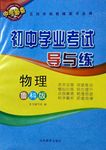题目内容
.
____ the answer, Tom, who asked the questions, still stood with his hand ____.
| A.Giving; raised | B.Given; raised | C.Given; risen | D.Giving; rising |
B
解析

 初中学业考试导与练系列答案
初中学业考试导与练系列答案Let children learn to judge their own work. A child learning to talk does not learn by being corrected all the time; if corrected too much, he will stop talking. He notices a thousand times a day the difference between the language he uses and the language those around him use. Bit by bit, he makes the necessary changes to make his language like other people’s. In the same way, children learn to do all the other things without being taught to walk, run, climb, whistle, ride a bicycle…They compare their own performances with those of more skilled people, and slowly make the needed changes. But in school we never give a child a chance to find out his mistakes and correct them for himself. We do it all for him. We act as if we thought that he would never notice a mistake. If it is a matter in mathematics or science, give him the answer book. Let him correct his own papers. Why should we teachers waste time in such routine(日常的) work? Our job should be to help the child when he tells us that he can’t find the way to get the right answer. Let the children learn what all educated persons must some day learn, how to measure their own understanding, how to know what he does not know.
1.According to the passage, the best way for children to learn things is by_____.
|
A.listening to skilled people’s advice. |
|
B.asking older people many questions |
|
C.making mistakes and having them corrected |
|
D.doing what other people do |
2.Which of the following does the writer think teachers should NOT do?.
|
A.Give children correct answers |
|
B.Allow children to mark mistakes. |
|
C.Point out children’s mistakes to them. |
|
D.Let children mark their own work |
3.According to the writer, teachers in school should _____
|
A.allow children to learn from each other |
|
B.point out children’s mistakes whenever found |
|
C.correct children’s mistakes as soon as possible |
|
D.give children more book knowledge |
4.The passage suggests that learning to speak and learning to ride a bicycle are____
|
A.different from learning other skills |
|
B.the same as learning skills |
|
C.more important than other skills |
|
D.not really important skills |
5.The title of this passage could probably be_____
|
A.Let Us Teachers Stop Work |
|
B.Let Us Make Children Learn |
|
C.Let Children Correct Their Exercises |
|
D.Let Children Learn by Themselves |
第二节完形填空(共20小题;每小题1.5分,满分30分)
阅读下面短文,从短文后各题所给的四个选项(A、B、C和D)中,选出可以填入空白处的最佳选项。
One afternoon, I went to pick up my mother from work. I got a little early so I 36 the car by the roadside, and 37 for her.
As I looked 38 the car window to my right, I saw a little boy around two years old in a small park, 39 freely on the grass as his _40___ watched him from a short distance. The boy had a __41___ smile on his face. He would then fall to the grass, get up , and without__42___ or without looking back at his mother, run as fast as he could, again, still with a big smile on his face, as if __43___ had happened.
With 44 especially at an early age, when they fall down, they don’t consider their falling down as a failure, __45___ instead, they treat it as a learning experience. They try and try again _46____ they succeed.
The answer must be that they have not connected “falling down” with the word “__47__” yet. Thus they don’t know __48__ to feel the state which accompanies failure. They probably think that it is perfectly okey to fall down, and that it’s not _49___ to do so. In other words, they give themselves permission (许可) to _50___ mistakes subconsciously(潜意识地). Thus they always remain encouraged.
I was _51___ by the boy’s persistence(坚持) and the manner in which he ran. With each _52___, he looked so confident. No _53__ of fear, or of being discouraged ----- as if he didn’t _54___ the world around him. His only aim was to run _55___ and to do it as effectively as he could. I learned a lot from that observation and experience.
36.A.packed B.parked C.refueled D.cleaned
37.A.called B.looked C.waited D.searched
38.A.inside B.outside C.around D.for
39.A.walking B.running C.jumping D.playing
40.A.teacher B.friend C.father D.mother
41.A.sad B.little C.big D.weak
42.A.doubt B.hesitation C.mercy D.effect
43.A.nothing B.something C.everything D.anything
44.A.kids B.girls C.adults D.parents
45.A.and B.if C.but D.so
46.A. unless B.after C.until D.before
|
47.A.pain B.failure C.state D.mistake
48.A.how B.what C.why D.where
49.A.good B.interesting C.right D.wrong
50.A.avoid B.correct C.make D.admit
51.A.bothered B.touched C.confused D.frightened
52.A.cry B.success C.try D.smile
53.A.scenes B.marks C.signals D.signs
54.A.care about B.ignore C.adjust to D.expect
55.A.safely B.unsteadily C.regularly D.freely